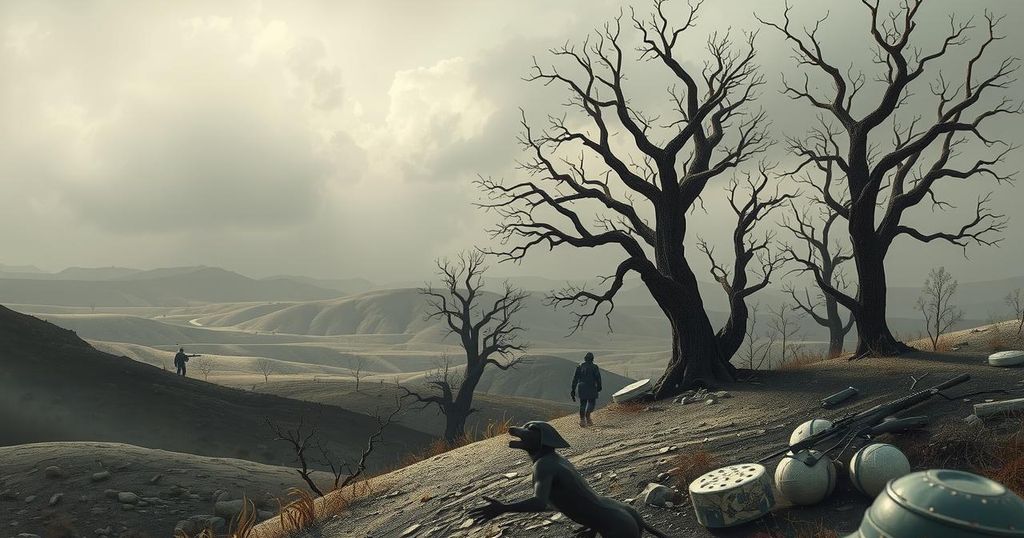World news
ADF, AFRICA, AFRICA CENTER FOR STRATEGIC STUDIES, AL JAZEERA, ALLIED DEMOCRATIC FORCES, BUKAVU, CIVIL WAR, CODECO, CONGO, CONGO (KINSHASA), COOPERATIVE FOR THE DEVELOPMENT OF CONGO, DEMOCRATIC REPUBLIC OF THE CONGO, DISPLACEMENT, DR CONGO, DRC, GOMA, HUMANITARIAN, HUMANITARIAN CRISIS, ITURI, KINSHASA, KIVU, M23, NORTH, PAUL NANTUL, PAUL NANTULYA, RWANDA, SEXUAL VIOLENCE, SOUTH KIVU, UGANDA, UK, UNITED NATIONS, WALIKALE, WAR
Elena Martinez
0 Comments
DRC Conflict Reignites Historical Tensions Amid M23 Advances and Regional Interference
The ongoing conflict in the DRC is drawing parallels to the brutal Congo wars, as M23 rebels advance, reportedly supported by Rwanda. Uganda has also increased military activity near its border with the DRC. Analysts express concern that the conflict could escalate into a broader regional war unless addressed. The historical context of foreign intervention reiterates the complexities underlying the present situation, with calls for political negotiations and accountability emerging as critical for resolution.
The ongoing conflict in the Democratic Republic of the Congo (DRC) has exacerbated fears of a return to the brutal Congo wars, as M23 rebels advance towards Kinshasa with alleged support from neighbouring Rwanda. Recent captures of eastern cities, including Goma and Bukavu, have left local communities in turmoil, prompting many to either prepare for conflict or evacuate for safety. The DRC government has attempted to counter these advances with a substantial monetary reward for capturing M23 leaders, but progress has been limited.
In addition to M23’s aggressive movement, Uganda has bolstered military presence near DRC, claiming to fight local armed groups like the Allied Democratic Forces (ADF) and CODECO. These developments have alarmed regional analysts, who assert that Rwanda and Uganda’s involvement reflects historical patterns similar to those observed during the Second Congo War of the late 1990s. The potential for a regional conflict looms large if current tensions are not addressed.
Political observers underscore the likelihood of another humanitarian crisis reminiscent of the Congo wars, which had a death toll of approximately five million. Ongoing illegal mining activities in the DRC underscore the continued exploitation of its vast mineral resources, a situation that exacerbates the dire humanitarian conditions for its citizens. Amid this unrest, the will for political negotiation appears diminished, further complicating peace efforts.
For over three decades, the DRC has been plagued by low-level violent conflicts driven by myriad factors, including ethnic tensions and resource competition. Rwanda and Uganda previously intervened, intending to address grievances related to rebel activities and resource access. Such interventions led to the overthrow of President Mobutu and significant geopolitical shifts within the region.
Many stakeholders have remained entrenched in the conflict, with accusations of human rights violations and resource exploitation directed towards Rwandan and Ugandan forces. The pursuit of local and foreign economic interests has turned natural resource extraction into a primary conflict driver, causing grave human rights abuses and complicating any resolution.
Despite the DRC’s historical experiences with foreign intervention, current assessments suggest that outside influence has never truly ceased. Analysts assert that Uganda and Rwanda maintain a subtle yet persistent involvement in DRC affairs, seemingly positioning themselves in preparation for another round of conflict. The United Nations has documented significant Rwandan troop involvement with M23, while Uganda navigates its role between support for the DRC and potential complicity with rebel forces.
The vast mineral wealth of regions afflicted by M23 capture has led to speculation concerning the financing of the group through illegal gold trafficking. Analysts warn that an effective resolution demands broad participation from African nations, emphasizing the need for both internal DRC reform and international support to address political and social grievances.
Efforts to establish a national dialogue are crucial in this context, along with calls for accountability from the International Criminal Court regarding all parties involved in the conflict. The need for stability in the DRC is underscored by analysts advocating for the survival and empowerment of Congolese citizens, who are essential to the nation’s future recovery.
The resurgent conflict in the DRC, marked by the advances of M23 rebels and the historical patterns of foreign intervention, raises fears of a repetition of the devastating Congo wars. As regional powers re-engage in the conflict, the importance of addressing root causes, promoting political negotiations, and ensuring accountability for human rights violations cannot be overstated. The humanitarian plight of Congolese people necessitates urgent international attention, highlighting that peace in the DRC is crucial not only for the nation but for regional stability. The call for a break from this cycle of violence is not solely for the DRC but extends to the broader continent, advocating for the well-being of all African nations dependent on the stability of the region.
Original Source: www.aljazeera.com




Post Comment